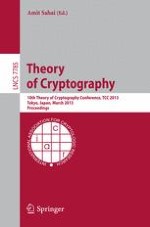2013 | OriginalPaper | Buchkapitel
Distributed Oblivious RAM for Secure Two-Party Computation
verfasst von : Steve Lu, Rafail Ostrovsky
Erschienen in: Theory of Cryptography
Verlag: Springer Berlin Heidelberg
Aktivieren Sie unsere intelligente Suche, um passende Fachinhalte oder Patente zu finden.
Wählen Sie Textabschnitte aus um mit Künstlicher Intelligenz passenden Patente zu finden. powered by
Markieren Sie Textabschnitte, um KI-gestützt weitere passende Inhalte zu finden. powered by
We present a new method for secure two-party Random Access Memory (RAM)
program
computation that does not require taking a program and first turning it into a circuit. The method achieves logarithmic overhead compared to an insecure program execution.
In the heart of our construction is a new Oblivious RAM construction where a client interacts with two non-communicating servers. Our two-server Oblivious RAM for
n
reads/writes requires
O
(
n
) memory for the servers,
O
(1) memory for the client, and
O
(log
n
) amortized read/write overhead for data access. The constants in the big-O notation are tiny, and we show that the storage and data access overhead of our solution concretely compares favorably to the state-of-the-art single-server schemes. Our protocol enjoys an important feature from a practical perspective as well. At the heart of almost all previous single-server Oblivious RAM solutions, a crucial but inefficient process known as oblivious sorting was required. In our two-server model, we describe a new technique to bypass oblivious sorting, and show how this can be carefully blended with existing techniques to attain a more practical Oblivious RAM protocol in comparison to all prior work.
As alluded above, our two-server Oblivious RAM protocol leads to a novel application in the realm of secure two-party RAM program computation. We observe that in the secure two-party computation, Alice and Bob can play the roles of two non-colluding servers. We show that our Oblivious RAM construction can be composed with an extended version of the Ostrovsky-Shoup compiler to obtain a new method for secure two-party
program
computation with lower overhead than all existing constructions.
